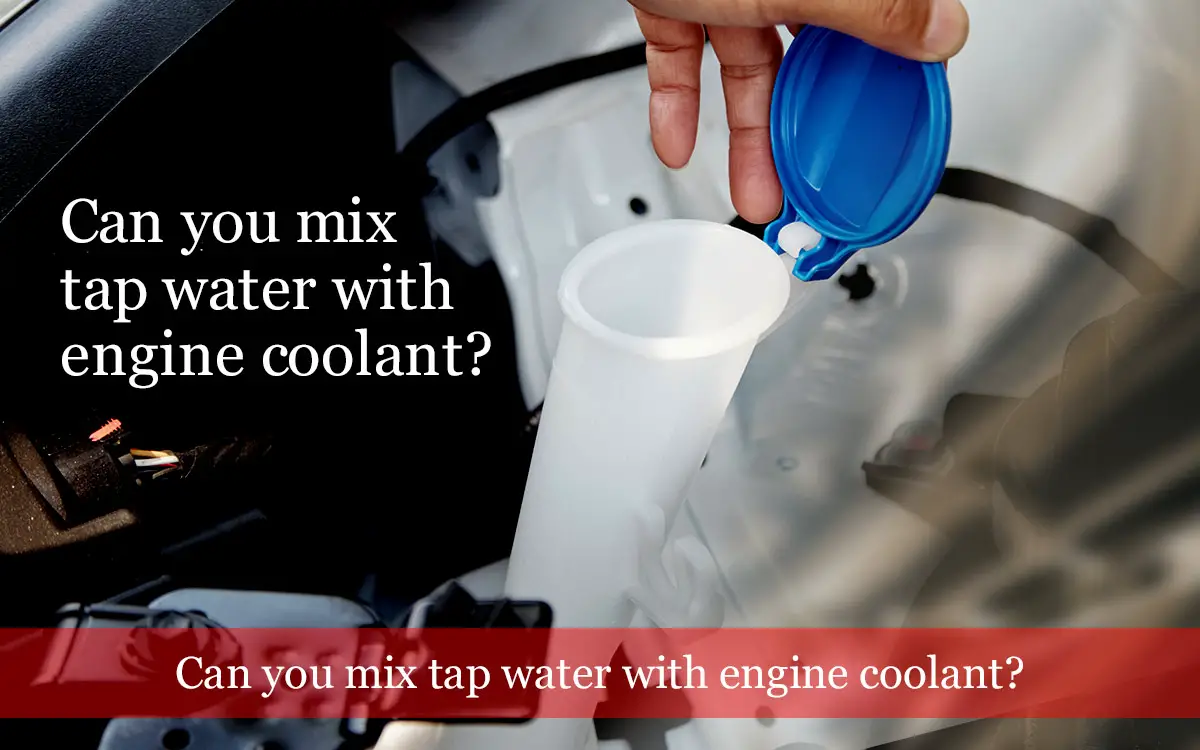Have you ever wondered what would happen if you mixed tap water with engine coolant? Well, let me paint you a picture. Imagine traveling on a serene summer day, with the sun shining and a gentle breeze blowing through your hair. You realize you have to top up your coolant and you pop the hood of your car, ready to give it a little TLC. As you reach for the coolant reservoir, you realize you have run through your coolant, you spot a nearby faucet, tempting you with its cool, refreshing water.
Your curiosity gets the best of you, and before you know it, you’ve poured a generous amount of tap water into the coolant reservoir. Little did you know, this seemingly innocent act could spell disaster for your engine.
This article delves into the risks of combining tap water and engine coolant, uncovering the dangers that await the unsuspecting car owner. So, buckle up and prepare to dive into Water vs. Coolant: The Ultimate Battle for Your Engine’s Affection.
So can you mix tap water with coolant? I would strongly advise against it! Keep reading to find out the dangers of combining these two liquids.
Reasons Why You Shouldn’t Mix Water and Engine Coolant
There are a number of reasons you should absolutely avoid mixing tap water and engine coolant. Here’s why:
- Rust and Corrosion
- Freezing Point
- Ion Exchange
- Contamination
Let’s explore these in detail:
1. Rust and Corrosion
First and foremost, tap water typically contains minerals such as calcium and magnesium that can instantly corrode the metals used in your vehicle’s cooling system. Over time, this corrosion will weaken the engine parts, leading to poor performance and costly repairs. Additionally, the pH balance of tap water is usually higher than what is recommended for use in automotive fluids.
This can ultimately lead to the build-up of scale, a process that increases pressure within the cooling system and increases your chances of engine damage.
I was used to mixing water with coolant, and the result was certainly not pretty. I started having troubles with my car and realized the radiator had corroded and had to replace it shortly after which cost a few dollars.
2. Freezing Point
In addition to rust and corrosion, tap water can also reduce the freezing point of engine coolant. This is because tap water does not contain antifreeze like most automotive fluids, meaning that it lacks the chemicals necessary to prevent your vehicle from freezing in cold temperatures.
This is especially dangerous during winter months as it can cause your car’s engine to seize up, leaving you stranded on a cold day with an expensive repair bill. If you are like me and you live in an area with cold winters, it is best to avoid mixing water and coolant altogether.
3. Ion Exchange
Again, tap water also contains dissolved ions such as calcium and magnesium that can quickly clog up your cooling system when mixed with engine coolant. This is because these ions react with the chemicals in the antifreeze which in turn leads to ion exchange.
Ion exchange can reduce the cooling power of your engine coolant and cause a buildup of scale in the radiator, both of which can lead to overheating and engine damage.
4. Contamination
Lastly, mixing tap water with engine coolant can result in contamination of the entire cooling system. This is because tap water contains many dissolved contaminants that can react with the chemicals in the antifreeze and cause corrosion or scale buildup.
It is therefore best to avoid mixing water and coolant altogether as it can be a costly repair if your vehicle’s engine overheats due to contaminated fluids.
All of these issues mentioned above can be costly to repair and can potentially damage your vehicle’s engine beyond repair. Therefore, it is best to avoid mixing the two fluids altogether.
After all, prevention is better than cure and taking the time to ensure that your vehicle’s cooling system is properly maintained will save you a lot of headaches in the long run.
Water vs. Coolant which is better?
Water vs. Coolant is a common debate among car owners because both fluids have advantages and disadvantages.
- Cheap and Available
- Provides Lubrication
- long Lifespans
1. Cheap and Available
The first advantage of using water as a coolant is that it is much cheaper than engine coolant. It also is widely available, meaning you can easily find it in your homes, local store or even workplaces. Coolant on the other hand is much more expensive and can be harder to find depending on the type of engine coolant. It is also a good idea to use the exact type of coolant recommended by the manufacturer, which can be difficult to find.
2. Provide Lubrication
Using engine coolant also provides additional protection for your vehicle’s engine components as it contains lubricants that help reduce wear and tear on the engine parts. This is especially beneficial for older vehicles or those that are driven often.
Water on the other hand does not provide any lubrication and can cause corrosion over time, resulting in a decrease in engine performance.
3. Long Lifespans
Finally, coolant typically has longer lifespans than water. Water needs to be replaced every few months as it will become contaminated with dirt, debris, and other particles that will reduce its cooling ability. Coolant on the other hand can last for years and needs to be replaced only when it starts to lose its effectiveness.
Despite the advantages of water, engine coolant is generally considered the better option as it is more cost-effective and provides more protection for your vehicle’s engine components. Preventing problems in the future is always bet
Having a well-maintained cooling system helps ensure that your vehicle operates at its best and helps extend the life of your engine.
How to Maintain Your Cooling System
The cooling system in your car needs regular maintenance to prevent it from malfunctioning and damaging other parts of the vehicle. Here are some tips on how to properly maintain your cooling system:
1. Regularly Check the Fluid Levels
Check the liquid level in the coolant reservoir often, making sure that it is filled up with a mixture of coolant according to manufacturer specifications. Low levels of coolant can lead to overheating, and you should top it up with the correct mixture as quickly as possible.
I would recommend you use the manufacturer’s recommended coolant, as it is designed to prevent corrosion and increase the lifespan of your car’s engine.
2. Change Coolant Regularly
If you haven’t done so in a while, consider changing your cooling system’s coolant. Coolant should be replaced every two or three years for optimal performance, depending on how often you drive your vehicle.
Coolant should also be changed if it becomes contaminated with dirt, debris, and other particles that will reduce its cooling ability.
3. Check Hoses for Cracks and Leaks
Check the hoses connected to your car’s radiator for any signs of wear and tear such as cracks or leaks. If you notice any, replace the hoses as soon as possible. Hoses tend to be made from rubber, which is prone to cracking over time.
4. Check the Radiator for Damage
I would also suggest you make sure to check your radiator for any blockages such as leaves or dirt that could prevent coolant from flowing through it properly. Regularly cleaning your radiator with a soft brush will help keep it free of debris and maximize its performance.
5. Keep an Eye on the Temperature Gauge
Keep an eye on your car’s temperature gauge. If it starts to move towards the hot side, pull over immediately and turn off your engine. This could be a sign that there is not enough coolant or the cooling system isn’t functioning properly.
It is important to always take precautions when dealing with water and coolant systems. By following this tip, you can keep your car’s engine running smoothly and avoid costly repairs in the future.
6. Keep an Emergency Coolant Kit
Again, I will suggest you make sure to always have a spare coolant bottle or two in your car as part of an emergency kit. In case of an unexpected breakdown due to a lack of coolant, this can be a lifesaver. Don’t forget to check the expiration date on your coolant bottles regularly and keep them stored in a dry, clean place.
7. Request Professional Help
If you feel like you are not comfortable tackling any of these tasks yourself, it is always advisable to call a certified mechanic or take your car to a licensed service center. Explaining your issue in detail and outlining any steps you have already taken can help the mechanic diagnose the problem and provide the best solution for it.
Remember that properly maintaining your car’s water and coolant system is key to keeping your engine running smoothly. Investing a bit of time in looking after these elements will prevent costly repairs down the line.
Final Thought
I will conclude this article by stressing the importance of not mixing water and coolant and also being aware of your car’s water and coolant systems. Always keep an eye on them, look out for any warning signs and take appropriate action when needed. This will help you ensure that your car is running without any risk or danger to yourself and others.

